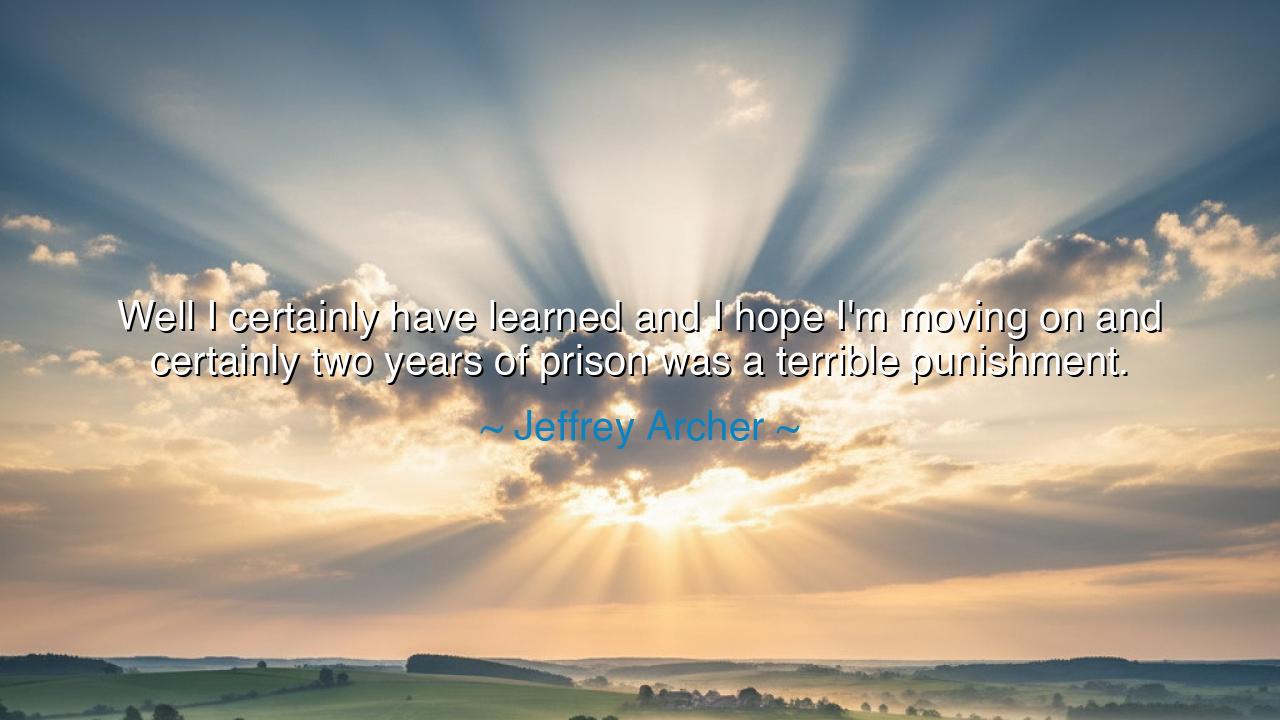
Well I certainly have learned and I hope I'm moving on and
Well I certainly have learned and I hope I'm moving on and certainly two years of prison was a terrible punishment.






The words of Jeffrey Archer — “Well I certainly have learned and I hope I’m moving on and certainly two years of prison was a terrible punishment.” — carry the tone of a man who has walked through shadow and come forth scarred, yet still striving toward the light. These are not the words of triumph, but of humility, spoken by one who has tasted the bitterness of downfall. They remind us that the measure of a person is not found in how they stand in glory, but in how they rise from disgrace.
When Archer speaks of having learned, he gestures toward the eternal truth that suffering is the fiercest teacher. No classroom is as sharp, no book as relentless, no mentor as unyielding as the iron bars of consequence. To be confined, stripped of freedom, made to reflect on one’s choices in solitude — this is a crucible that either breaks the spirit or reforges it in strength. Thus his words echo the wisdom of the ancients: that wisdom comes not only from victory, but from wounds endured.
Consider the fate of Boethius, the Roman philosopher cast into prison by Theodoric the Great. There, in his cell, awaiting death, Boethius penned The Consolation of Philosophy, one of the most enduring works of thought. From the pit of despair he reached toward the stars, and his suffering became the source of his immortality. Archer’s acknowledgment of his punishment recalls this same paradox: that even behind walls, the mind may wander, the soul may learn, and one may yet leave behind chains stronger than those of iron — chains of ignorance, pride, or folly.
The admission of punishment also speaks to the justice of life. For every deed, whether noble or corrupt, carries its weight. The ancient Greeks called this Nemesis, the balancing force of the cosmos. To suffer two years in prison is not merely to be locked away, but to pay the toll demanded by the scales of fate. And yet, Archer’s words also reveal that punishment need not be the end. In confessing its terribleness, he also speaks of hope: “I hope I am moving on.” This is the call of the human spirit, to leave behind what has been endured and press toward renewal.
His words teach us that even in disgrace, there lies the seed of redemption. The shame of the fall does not blot out the possibility of rising. History tells us of Nelson Mandela, who endured twenty-seven years in a cell, yet emerged not broken but stronger, carrying forgiveness in his heart and vision for his people. Though Archer’s case is not the same in its nobility, the underlying truth remains: the prison may hold the body, but it cannot forever imprison the will to begin anew.
The lesson, then, is this: do not despair when life hands you punishment, whether deserved or undeserved. For even punishment can be a furnace that tempers the soul. To the youth I say: when you fall, do not deny it, do not wallow in it. Instead, admit it, learn from it, and let it make you wiser. When confined by your own mistakes, use that confinement to strengthen your spirit, so that when the gates open, you emerge changed, not chained.
In practical life, this means embracing humility. Keep a journal of what your hardships have taught you. Speak less of blame and more of lessons. Seek forgiveness where you can, and forgive yourself where you must. Do not linger on what is lost, but strive to build anew. For every man or woman will one day stumble, but only those who move on in wisdom transform punishment into power.
Thus, Archer’s words endure as a mirror for all of us: that life is both merciless and merciful, that failure is both fall and teacher, and that the true mark of strength is not to avoid punishment, but to endure it, learn from it, and rise again. Learn. Endure. Move on. That is the path of wisdom.






AAdministratorAdministrator
Welcome, honored guests. Please leave a comment, we will respond soon